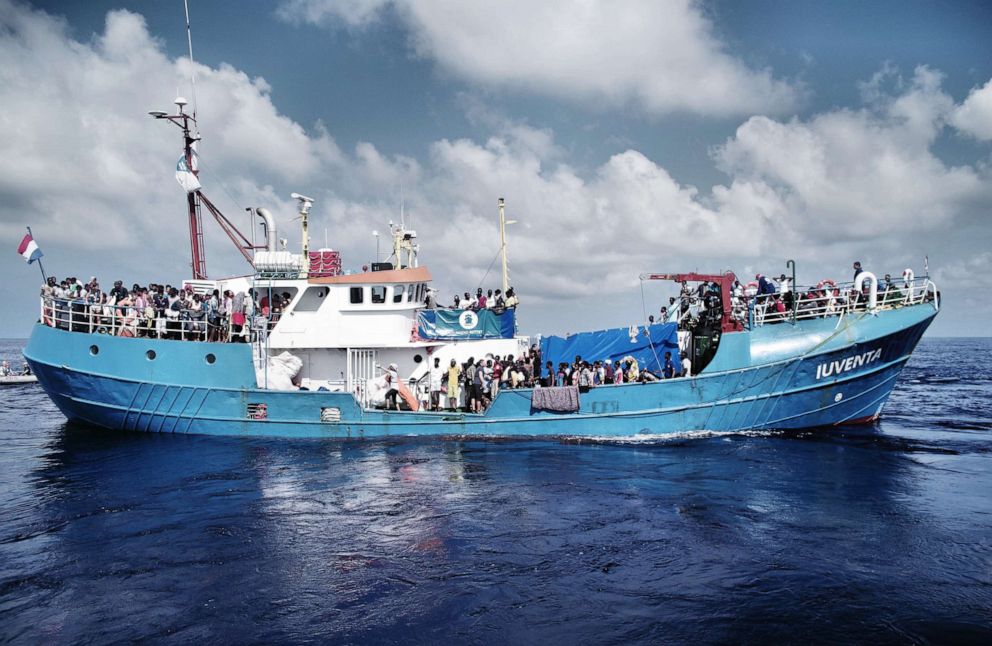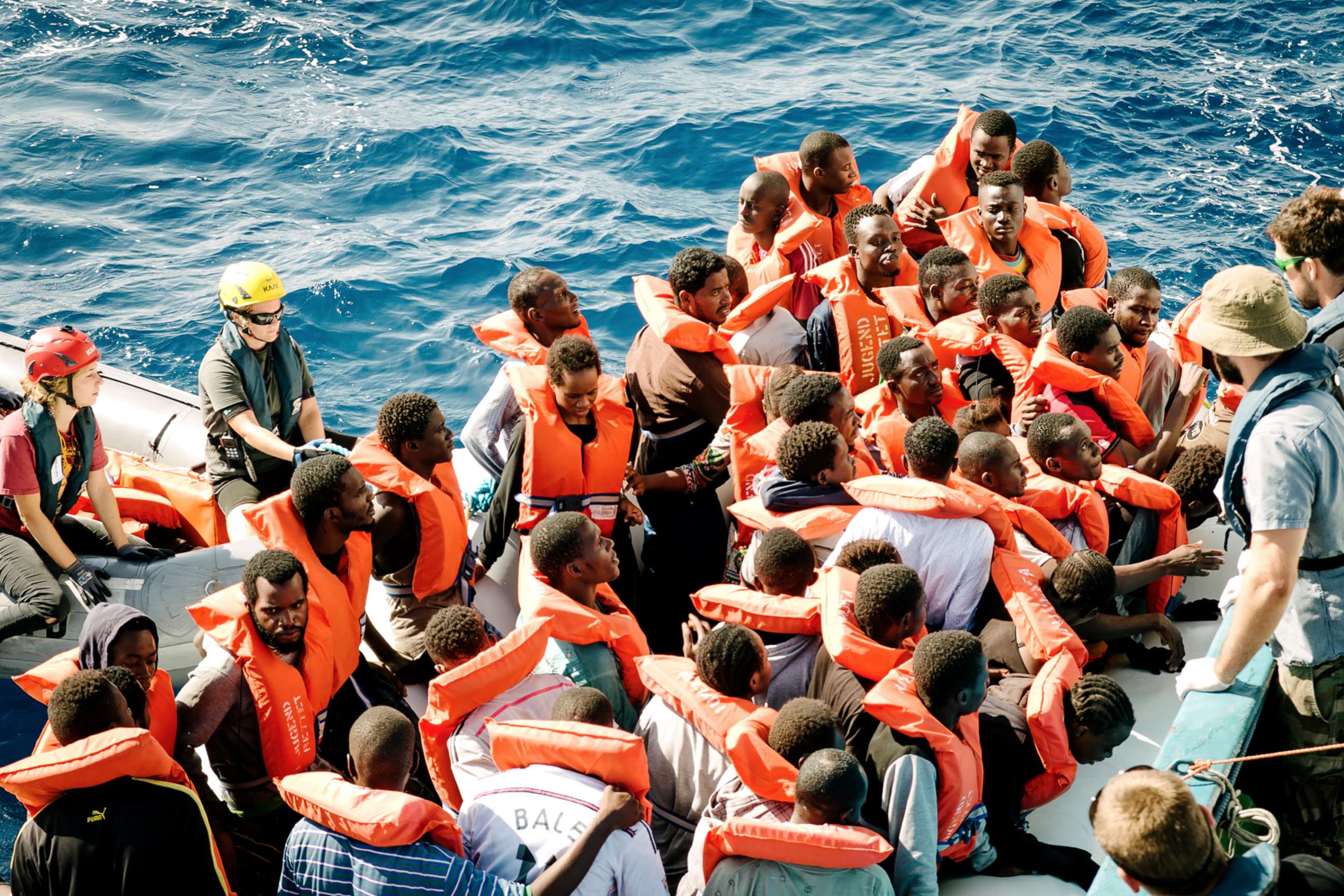Volunteers from the ship Iuventa saved thousands of migrant lives on the Mediterranean; now they could face prison
There is a growing trend in Europe of criminalizing volunteers helping migrants.
BERLIN and ROME -- When he was rescued in the Mediterranean by the Iuventa in 2016 -- a humanitarian vessel run by a German NGO -- Mohammed was convinced he would be sent back to Libya. He had already been imprisoned twice for his social media activity publicizing the violence he’d seen at the hands of local militias.
“A volunteer calmed me down. She said, ‘Don’t worry, you won’t go back to Libya,' but I didn’t believe her,’” the 25-year-old, whose name is being withheld because he fears for his safety, told ABC. “I also knew I had nothing else to lose."
Libya has been the site of violent clashes by local militias vying for power since President Moammar Gadhafi was overthrown by NATO-backed forces in 2011. No longer wanting to make his family a target, Mohammed said he was desperate to get to safety in Europe and had unsuccessfully tried the perilous Mediterranean crossing twice.
The first time, his boat capsized near shore and four passengers died, he said. The final time, he said he was spotted by the crew after floating directionless for hours. “It was just luck – we would die if nobody found us,” he added.
In just a year's time -- from July 2016 until August 2017 -- the Iuventa saved 14,000 lives, including Mohammed’s, according to the ship's records. But in 2017, Italian authorities seized the boat and launched a criminal investigation against 10 volunteers, accusing them of "aiding and abetting illegal migration" by coordinating directly with smugglers.
Trapani prosecutor Ambrogio Cartosio said in a press conference that the crew working aboard the Iuventa brought migrants aboard the ship who were escorted by Libyan traffickers, according to Italian news agency ANSA. The volunteers' electronic devices were seized and are currently being reviewed for proof of direct communication with traffickers. If the evidence is strong enough, the case will be pushed to court in Italy, most likely by the end of this year, according to the Iuventa's lawyer, Nicola Canestrini.
Iuventa representatives refute the charges, insisting that all rescue operations took place with permission of the Maritime Coordination Rescue Center in Rome as required, and claim the investigation is part of a “smear campaign” against search and rescue NGOs, according to a published statement. If the case goes to court, 10 volunteers, most of whom live in Germany, could face 20 years of jail time and fines of 15,000 euros per person rescued.
Human rights group Amnesty International also views the Iuventa's case as part of “a dangerous pattern of criminalizing people helping migrants and refugees in Europe.” Already, 250 individuals have been arrested, charged or investigated for providing shelter, food, transport to migrants without legal papers, according to a database put together by global news site openDemocracy, which compiled information from NGOs, researchers and activist groups.
The number of cases has risen dramatically in the last 18 months, and they are most frequent in countries like Italy and France, where far-right parties are in power at the national and local levels, the report found. Examples include Loan Torondel, a French activist who was charged with defamation in 2018 for tweeting a photo of a police office standing over a migrant in informal refugee camp in Calais in northern France, and a 2015 nominee for a Nobel Peace Prize for his work with refugees, Italian Catholic priest Don Mussie Zerai, who was under police investigation for allegedly "facilitating clandestine immigration" according to public prosecutors in Trapani, Italy.
Torondel was convicted in 2018, according to Amnesty International and was in the process of appealing as of May. Zerai denied the smuggling charges against him in 2017. "When I receive a distress call [from people coming to Europe] I collect information and I pass the information to the Italian coastguard so the authorities can intervene," he told the BBC at the time.

Parallels can be found in the U.S., where activists at the US-Mexico border have reported increased scrutiny under the Trump administration. In Arizona, activist Scott Daniel Warren was arrested and charged with conspiracy to transport and harbor migrants, yet the jury could not reach a verdict.
“It’s not a choice”
In search and rescue operations on the central Mediterranean, the situation is particularly grim. Last year, Italy and Malta stepped up efforts to ban rescue boats from coming to port, leaving few humanitarian aid vessels for those attempting “the world’s deadliest sea crossing” as it is now called by the United Nations High Commissioner on Refugees (UNHCR). In Italy, the head of the far-right The League party and Interior Minister, Matteo Salvini, even proposed fines of up to 50,000 euros for vessels carrying asylum-seekers in Italian waters, which prompted a response from UNHCR.
“At a time when European states have largely withdrawn from rescue efforts in the Central Mediterranean, NGO vessels are more crucial than ever,” said Roland Schilling, the UNHCR's regional representative to southern Europe. “Without them, it is inevitable that more lives will be lost.”
“When your country is destabilized by weapons, by war, it is not a choice to put yourself and your family in a rubber boat. When there is no rescue ship, no coast guard there, they drown,” said 25-year-old Laura Martin, one of the Iuventa crew members under investigation. Her case has not yet gone to court, but she could face up to 20 years and said fines if convicted on human trafficking charges, her lawyer said.
Martin worked on several missions on the RIB, a small, inflatable boat that first reaches a distressed vessel. For months after returning home to Berlin, she couldn’t walk past the canal without thinking that a dark shape in the water was someone in need of rescue.
“It’s frustrating that this situation even exists. Instead of putting resources into saving people and facing the reality of the situation, that there are thousands of people drowning on the Mediterranean and other flight routes,” she told ABC.

Although the number of people attempting the crossing is lower than it has been in years -- 139,300 refugees and migrants arrived in Europe in 2018, the lowest number in five years, according to UNHCR -- the crossing is more dangerous than ever. One person died for every 14 who reached Europe in 2018 (6 died every day), compared to one death for every 38 arrivals in 2017, according to UNHCR. This year, 512 people have lost their lives attempting the crossing, according to the latest data by the International Organization on Migration (IOM).
Canestrini, the lawyer for the Iuventa defendants, thinks his clients’ cases will go to court, given their political weight.

“Italian judicial authorities and the government put a lot of pressure on this case because they think that it can prove their assumption that helping migrants or survivors out of the water is going to increase illegal immigration” he said. “They assume that the presence of NGO ships pushes the people to come to Europe, which is wrong.” Evidence will be presented at the end of September, after which prosecutors in Trapani will decide whether to move ahead with a trial.
While the Iuventa remains impounded, the Italian interior minister, Salvini, has targeted German rescue vessel Sea Watch, one of the humanitarian boats to operate in the central Mediterranean, accusing its crew of not respecting the rules and of "trafficking human beings," as he said to Italian radio station Rai 1. The boat is currently carrying 43 migrants rescued near Libya is currently awaiting permission to disembark on the Italian island of Lampedusa, “I won’t give it permission to disembark now, nor at Christmas” Salvini told the station. "Those fleeing war can and must arrive in Italy without having to rely on human traffickers or pirate boats" he said, an apparent reference to NGO vessels.
In the meantime, the Iuventa volunteers are barred from doing search and rescue work while the investigation is underway. Instead they are raising awareness of the search and rescue situation and raising money for legal fees for the impending trial, estimated by their legal team at 300,000 euros.
"I have to sit still and watch" said the ship's captain, Dariush Beigui. "We could help, but we are not allowed to. I am terrified of what will happen in the summer months if Salvini continues to criminalize search and rescue crews; thousands more will die."
Now living in Dresden where he works at a restaurant, Mohammed said he felt “broken” when he learned the Iuventa had been banned from operating. He said he likes his life in Germany, but would gladly return home the moment his country is secure. “In Libya, there are people who can’t buy medicine or money for food, and if they can’t leave, they will die.”




